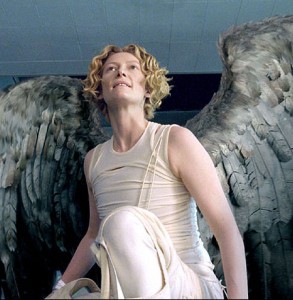Many words have been used to describe Scottish actress Tilda Swinton: “daring”, “unconventional”, “unpredictable”. The word I find myself most often using is “fearless.”
Too often, too many actors can be seen acting; their internal state obviously includes a self-consciousness that includes their reputation and self-image: “I’m ________, the famous actor, and I’m acting.” In strong contrast to this professional reserve Tilda Swinton completely embodies each role she undertakes, fearlessly setting aside considerations of her core self for the sake of properly expressing the character. Her steady gaze unblinkingly encounters the character’s world, and in that gaze she grants us a transparency into Tilda the person. Swinton came up through the British boarding school system into a season with the Royal Shakespeare Company. But she was attracted to more experimental and gender-b(l)ending roles. No project would prove too small or too large in her pursuit of interesting, challenging, and distinctive roles.
 Her famous involvement in androgynous roles is most notably expressed in Orlando (1992), Sally Potter’s screen adaptation of Virginia Woolf’s novel. Swinton was closely involved with the development of the project, the story of which involves the title character’s witnessing of hundreds of years of history as first a male, and then a female. (This film is a favorite of many people, and is so visually lush that it was among the very first titles I purchased on Blu-Ray even though I already had it on DVD.)
Her famous involvement in androgynous roles is most notably expressed in Orlando (1992), Sally Potter’s screen adaptation of Virginia Woolf’s novel. Swinton was closely involved with the development of the project, the story of which involves the title character’s witnessing of hundreds of years of history as first a male, and then a female. (This film is a favorite of many people, and is so visually lush that it was among the very first titles I purchased on Blu-Ray even though I already had it on DVD.)
Since so many of Tilda Swinton’s roles have been indie/experimental/alternative, she often runs under the mainstream radar, with many people recognizing her but not realizing just how active she is. But the first Chronicles of Narnia movie (2005) proved to the industry that she could have mainstream impact, with her spot-on, terrifying-but-dominatrix-fascinating portrayal of the White Witch.
Horror/comic fans discovered that she could bring her punch to mainstream productions when she brought androgynous power to the angel encountering Keanu Reeves’ Constantine (2005). Her Gabriel is simultaneously aloof and driven, feminine and masculine — a perfect role for Swinton.  A film that took Swinton firmly to the feminine side is Teknolust (2002), an indie that presented itself as “the first feature shot entirely in 24p.” The film’s premise, artificially-created women who need human semen to survive, plants it in exploitation B-movie soil, but Tilda dignifies the project. It’s easy to see why she took to the role — or, rather, one should say roles, as she portrays not only the scientist who created the women but also her three cloned “daughters.” In one of the high points of the film, we get to see all four characters at once, as the “girls” perform an interpretive dance for their creator:
A film that took Swinton firmly to the feminine side is Teknolust (2002), an indie that presented itself as “the first feature shot entirely in 24p.” The film’s premise, artificially-created women who need human semen to survive, plants it in exploitation B-movie soil, but Tilda dignifies the project. It’s easy to see why she took to the role — or, rather, one should say roles, as she portrays not only the scientist who created the women but also her three cloned “daughters.” In one of the high points of the film, we get to see all four characters at once, as the “girls” perform an interpretive dance for their creator:
(Teknolust has some interesting things to say about male/female relationships and how people interact on the internet, a good canvas for Swinton to paint upon. I particularly like the idea that the girls should be “more robotic” online, since people believe they are created characters and expect and actually prefer such artificiality.)
Tilda Swinton is one of those actresses who, when I see her name attached to a production, I will give that movie attention simply because she thought it was interesting enough to be involved in. And I look forward to seeing where she takes us next.


There is one comment